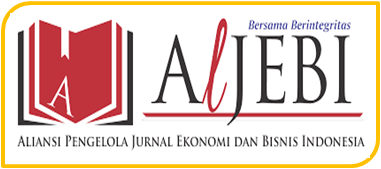EARNINGS MANAGEMENT AND PERFORMANCE: SHARIA VIS-A-VIS NON-SHARIA FIRMS
Abstract
Keywords
Full Text:
PDFReferences
Abdelsalam, O., Dimitropoulos, P., Elnahass, M., & Leventis, S. (2016). Earnings management behaviors under different monitoring mechanisms: The case of Islamic and conventional banks. Journal of Economic Behavior and Organization, 132, 155–173. https://doi.org/10.1016/j.jebo.2016.04.022
Abdullah, M. W. (2013). Manajemen Laba: Tantangan Manajer di Balik Sustainabilitas Perusahaan. Akmen Jurnal Ilmiah, 10(1), 128–137. https://e-jurnal.nobel.ac.id/index.php/akmen/article/view/370/373
Alam, M. M., & Ahsan, M. N. (2020). The Impact of Islamic Branding on Consumer Trust and Loyalty: Evidence from Islamic Banks in Bangladesh. Journal of Islamic Marketing, 11(2), 341–357. https://doi.org/10.1108/JIMA-09-2019-0224
Alsaadi, A. (2019). Can Inclusion in Religious Index Membership Mitigate Earnings Management? Journal of Business Ethics, 169(2), 333–354. https://doi.org/10.1007/s10551-019-04280-y
Alsaadi, A., Ebrahim, M. S., & Jaafar, A. (2017). Corporate social responsibility, Shariah-compliance, and earnings quality. Journal of Financial Services Research, 51(2), 169–194. https://doi.org/10.1007/s10693-016-0263-0
Alves, S. (2012). Ownership structure and earnings management: evidence from Jordan. Australasian Accounting, Business and Finance Journal, 6(1), 135–161. https://ro.uow.edu.au/aabfj/vol6/iss1/12/
Amaliah, I., Aspirantib, T., & Purnamasari, P. (2015). The Impact of the Values of Islamic Religiosity to Islamic Job Satisfaction in Tasikmalaya West Java, Indonesia, Industrial Centre. 2nd Global Conference on Business and Social Science-2015, GCBSS-2015, 17-18 September 2015, Bali, Indonesia, 984 – 991. https://doi.org/10.1016/j.sbspro.2015.11.131
Anwar, M. K., Suryaningsih, S. A., & Fahrullah, A. (2018). Religious Aspect of Sharia Bank Employees. IOSR Journal of Economics and Finance, 9(1), 24–27. https://doi.org/10.9790/5933-0901042427
Ashbaugh, H., LaFond, R., & Mayhew, B. (2003). Do nonaudit services compromise auditor independence? Accounting Review, 78(3), 611–639. https://www.jstor.org/stable/3203219
Audi, M., Sadiq, A., & Ali, A. (2021). Performance Evaluation of Islamic and Non-Islamic Equity and Bonds Indices: Evidence from selected Emerging and Developed Countries (No. 109866; MPRA Paper). https://mpra.ub.uni-muenchen.de/109866/
Barro, R. J., & McCleary, R. M. (2003). Religion and economic growth across countries. American Sociological Review, 68(5), 760–781.
Beck, T., Demirgüç-Kunt, A., & Merrouche, O. (2013). Islamic vs. Conventional Banking: Business Model, Efficiency, and Stability. Journal of Banking & Finance, 37(2), 433–447. https://doi.org/10.1016/j.jbankfin.2012.09.016
Belkaoui, & Riahi, A. (2006). Teori Akuntansi (kelima). Salemba Empat.
Bergstresser, D. ., & Phillipon, T. (2006). CEO Incentives and earnings management. Journal of Financial Economics, 80(3), 511 – 529. https://doi.org/10.1016/j.jfineco.2004.10.011
Boahen, E. O., & Mamatzakis, E. C. (2015). Does Religion Matter for Earnings Management? SSRN Electronic Journal, October, 1–56. https://doi.org/10.2139/ssrn.2668910
Cai, G., Li, W., & Tang, Z. (2018). Religion and the Method of Earnings Management: Evidence from China. Journal of Business Ethics, 161(1), 71–90. https://doi.org/10.1007/s10551-018-3971-6
Cai, Y., Kim, Y., Li, S., & Pan, C. (2019). Tone at the top: CEOs’ religious beliefs and earnings management. Journal of Banking and Finance, 106(C), 195–213. https://doi.org/10.1016/j.jbankfin.2019.06.002
Callen, J. L., & Fang, X. (2015). Religion and Stock Price Crash Risk. Journal of Financial and Quantitatif Analysis, 50(1–2), 169–195. https://doi.org/10.1017/S0022109015000046
Can, G. (2020). Does Sharia compliance affect financial reporting quality? An evidence from Muslim majority countries. International Journal of Islamic and Middle Eastern Finance and Management, 14(1), 16–33. https://doi.org/10.1108/IMEFM-04-2019-0149
Chen, D., Hu, X., Liang, S., & Xin, F. (2013). Religion tradition and corporate governance. Economic Research Journal, 59(10), 71–84. https://doi.org/10.1146/annurev.psych.55.090902.142015
Chen, K. Y., Elder, R. J., & Hsieh, Y.-M. (2007). Corporate Governance and Earnings Management: The Implications of Corporate Governance Best-Practice Principles for Taiwanese Listed Companies. Journal of Contemporary Accounting & Economics, 3(2), 73–105. https://doi.org/10.1016/S1815-5669(10)70024-2
Cialdini, R. B., & Goldstein, N. J. (2004). Social Influence: Compliance and Conformity. Annual Review of Psychology, 55(1), 591–621. https://doi.org/10.1146/annurev.psych.55.090902.142015
Conroy, S. J., & Emerson, T. L. N. (2004). Business Ethics and Religion: Religiosity as a Predictor of Ethical Awareness among Students. Journal of Business Ethics, 50(4), 383–396. https://www.jstor.org/stable/25075204
Dechow, P. M., Sloan, R. G., & Sweeney, A. P. (1995). Detecting Earnings Management. The Accounting Review, 70(2), 193–225. https://www.jstor.org/stable/i302551
Du, X., Jian, W., Lai, S., Du, Y., & Pei, H. (2015). Does Religion Mitigate Earnings Management? Evidence from China. Journal of Business Ethics, 131(3), 699–749. https://doi.org/10.1007/s10551-014-2290-9
Dyreng, S. D., Mayew, W. J., & Williams, C. D. (2012). Religious Social Norms and Corporate Financial Reporting. Journal of Business Finance & Accounting, 39(7–8), 845–875. https://doi.org/10.1111/j.1468-5957.2012.02295.x
Elghuweel, M. I., Ntim, C. G., Opong, K. K., & Avison, L. (2017). Corporate governance, Islamic governance and earnings management in Oman. Journal of Accounting in Emerging Economies, 7(2), 190–224. https://doi.org/10.1108/jaee-09-2015-0064
Elster, J. (1989). Social Norms and Economic Theory. Journal of Economic Perspectives, 3(4), 99–117. https://doi.org/10.1257/jep.3.4.99
Fang, H., Randolph, R. V. D. G., Chrisman, J. J., & Barnett, T. (2013). Firm religiosity, bounded stakeholder salience, and stakeholder relationships in family firms. Journal of Management, Spirituality and Religion, 10(3), 253–270. https://doi.org/10.1257/jep.3.4.99
Gati, V., Nasih, M., Agustia, D., & Haryawan, I. (2020). Islamic index, independent commissioner and firm performance. ACCOUNTING, CORPORATE GOVERNANCE & BUSINESS ETHICS, 7, 1–12. https://doi.org/10.1080/23311975.2020.1824440
Ghozali, I. (2021). Aplikasi Analisis Multivariate: dengan Program IBM SPSS 26 (10th ed.). Badan Penerbit Universitas Diponegoro.
Grullon, G., Kanatas, G., & Weston, J. (2010). Religion and Corporate (Mis) Behavior by Religion and Corporate (Mis) Behavior (Issue 713). https://doi.org/10.2139/ssrn.1472118
Guay, W., Kothari, S., & Watts, R. (1996). A market-based evaluation of discretionary accrual models. Guay, W., Kothari, S., & Watts, R. (1996). A Market-Based Evaluation of Discretionary Accrual Models. Journal of Accounting Research, 34, 83–105.Journal of Accounting Research, 34, 83–105. https://doi.org/10.2307/2491427
Hamid, S., Craig, R., & Clarke, F. (1993). Religion: A confounding cultural element in the international harmonization of accounting Abacus. Retrieved from Jml2012.Indexcopernicus.Com, 29(2), 131–148. https://www.academia.edu/5791945/Religion_A_Confounding_Cultural_Element_in_the_International_Harmonization_of_Accounting
Hariyadi, I., & Mahmudi, L. N. (2020). Pengaruh Religiusitas Terhadap Kinerja Karyawan. Islamic Economics Journal, 6(2), 159–173. https://doi.org/10.21111/iej.v6i2.4600
Hilary, G., & Hui, K. W. (2009). Does religion matter in corporate decision making in America? Journal of Financial Economics, 93(3), 455–473. https://doi.org/10.1016/j.jfineco.2008.10.001
Hossain, M., & Lipy, S. (2020). The Effect of Islamic Finance on Firm Performance: Evidence from Listed Companies in the Middle East. International Journal of Islamic and Middle Eastern Finance and Management, 13(3), 415–433. https://doi.org/10.1108/IMEFM-01-2020-0045
Islam, T., & Khatoon, A. (2024). How does ethical leadership enhance employee work engagement? The roles of trust in leader and harmonious work passion. Kybernetes, 53(6), 2090–2106. https://doi.org/10.1108/K-09-2022-1343
Jaggi, B., & Tsui, J. (2007). Insider Trading, Earnings Management and Corporate Governance: Empirical Evidence Based on Hong Kong Firms. Journal of International Financial Management and Accounting, 18(3), 192–222. https://doi.org/10.1111/j.1467-646X.2007.01012.x
Jazil, T., & Hendrasto, N. (2021). Prinsip & Etika Bisnis Syariah (Pertama). Institut Tazkia. kneks.go.id/storage/upload/1686216705
Jensen, M. C., & Meckling, W. H. (1976). Theory Of The Firm : Managerial Behavior, Agency Costs And Ownership Structure. Journal of Financial Economics, 3(4), 305–360. https://doi.org/10.1016/0304-405X(76)90026-X
Jiang, F., Jiang, Z., Kim, K. A., & Zhang, M. (2015). Family-firm risk- taking: Does religion matter? Journal of Corporate Finance, 33, 260–278. https://doi.org/10.1016/j.jcorpfin.2015.01.007
Jiang, F., Ma, Y., & Wang, X. (2020). Multiple blockholders and earnings management. Journal of Corporate Finance, 64, 1–21. https://doi.org/10.1016/j.jcorpfin.2020.101689
Johnson, B. R., Jang, S. J., Larson, D. B., & De Li, S. (2001). Does adolescent religious commitment matter? A reexamination of the effects of religiosity on delinquency. Journal of Research in Crime and Delinquency, 38(1), 22–44. https://doi.org/10.1177/0022427801038001002
Jones, J. J. (1991). Earnings Management During Import Relief Investigations. Journal of Accounting Research, 29(2), 193. https://doi.org/10.2307/2491047
Kassem, R. (2012). Earnings Management and Financial Reporting Fraud: Can External Auditors Spot the Difference? American Journal of Business and Management, 1(1), 30–33. https://ssrn.com/abstract=2121218
Kasznik, R. (1999). On the Association between Voluntary Disclosure and Earnings Management. Journal of Accounting Research, 37(1), 57–81. https://doi.org/doi.org/10.2307/2491396
Kennedy, E. J., & Lawton, L. (1998). Religiousness and business ethics. Journal of Business Ethics, 17(2), 163–175. https://doi.org/10.1023/a:1005747511116
Kim, H.-Y. (2013). Statistical notes for clinical researchers: assessing normal distribution (2) using skewness and kurtosis. Restorative Dentistry & Endodontics, 38(1), 52. https://doi.org/10.5395/rde.2013.38.1.52
Kimani, S. (2024). The Influence of Religious Beliefs on Social Behavior and Community Cohesion. International Journal of Humanity and Social Sciences, 3(3), 60–73. Users/DELL/Downloads/The_Influence_of_Religious_Beliefs_on_Social_Behav.pdf
Korkmaz, A. G., Ma, Q., & Zhou, H. (2017). Blockholder Characteristics and Earnings Quality. Journal of Accounting and Finance, 17(3), 63–80. https://www.articlegateway.com/index.php/JAF/article/view/957
Kothari, S. P., Leone, A. J., & Wasley, C. E. (2005). Performance matched discretionary accrual measures. Journal of Accounting and Economics, 39(1), 163–197. https://doi.org/10.1016/j.jacceco.2004.11.002
Kusuma, M. (2023). Can the Reclassification of Other Comprehensive Income Narrow the Opportunities for Creative Accounting: Earnings Management and Income Smoothing? Jurnal Akuntansi Dan Keuangan, 25(1), 25–38. https://doi.org/10.9744/jak.25.1.25-38
Lararenjana, E. (2020). Macam-Macam Norma dalam Kehidupan Bermasyarakat yang Patut Anda Ketahui. Merdeka.Com. https://www.merdeka.com/jatim/macam-macam-norma-dalam-kehidupan-bermasyarakat-yang-patut-anda-ketahui-kln.html
Lassoued, N., Attia, M. B. R., & Sassi, H. (2018). Earnings management in islamic and conventional banks: Does ownership structure matter? Evidence from the MENA region. Journal of International Accounting, Auditing and Taxation, 30(C), 85–105. https://doi.org/10.1016/j.intaccaudtax.2017.12.003
Lencioni, P. (2012). The Advantage: Why Organizational Health Trumps Everything Else in Business. John Wiley & Sons, Inc. https://books.google.co.id/books/about/The_Advantage.html?id=Q6tDxt5tg8oC&redir_esc=y
Liu, C., Chung, C. Y., Sul, H. K., & Wang, K. (2018). Does hometown advantage matter? the case of institutional blockholder monitoring on earnings management in Korea. Journal of International Business Studies, 49(2), 196–221. https://doi.org/10.1057/s41267-017-0093-9
Longenecker, J. G., McKinney, J. A., & Moore, C. W. (2004). Religious intensity, evangelical christianity, and business ethics: An empirical study. Journal of Business Ethics, 55(4), 373–386. https://doi.org/10.1007/s10551-004-0990-2
Lu, L., & Wu, Y. (2020). Does religion enhance firm performance? Evidence from private firms in China. China Economic Review, 62. https://doi.org/10.1016/j.chieco.2020.101480
McGuire, S. T., Omer, T. C., & Sharp, N. Y. (2012). The impact of religion on financial reporting irregularities. Accounting Review, 87(2), 645–673. https://doi.org/10.2308/accr-10206
Mirza, A., & Khalid, R. (2020). The Role of Consumer Trust in the Performance of Islamic Financial Institutions. Journal of Islamic Financial Studies, 6(2), 50–67. https://doi.org/10.1016/j.jifs.2020.05.003
Moid, S. (2016). A Theoretical Construct of the Impact of Religious Beliefs on Accounting Practices in the Indian and Global Context. Management Review, XXXI(August), 90–103. https://www.scribd.com/document/410658527/A-Theoretical-Construct-of-the-Impact-of-Religious-Beliefs-on-Accounting-Practices-in-the-Indian-and-Global-Context
Monica, N., Putri, A., Afrilyani, R., & Haryanti, R. (2023). Analisis Kecurangan Laporan Keuangan PT Asuransi Jiwasraya dengan Analisis Fraud Pentagon. Sanskara Akuntansi Dan Keuangan, 1(2), 92–99. https://doi.org/10.58812/sak.v1i02.70
Montenegro, T. M. (2017). Religiosity and corporate financial reporting: evidence from a European country. Journal of Management, Spirituality and Religion, 14(1), 48–80. https://doi.org/10.1080/14766086.2016.1249395
Nurhadi. (2021). 10 Negara dengan Penduduk Muslim Terbanyak di Dunia. Tempo.Co. https://dunia.tempo.co/read/1516427/10-negara-dengan-penduduk-muslim-terbanyak-di-dunia/full&view=ok
Perols, J. L., & Lougee, B. A. (2011). The relation between earnings management and financial statement fraud. Advances in Accounting, 27(1), 39–53. http://dx.doi.org/10.1016/j.adiac.2010.10.004
Pieper, T. M., Williams, R. I., Manley, S. C., & Matthews, L. M. (2020). What Time May Tell: An Exploratory Study of the Relationship Between Religiosity, Temporal Orientation, and Goals in Family Business. Journal of Business Ethics, 163(4), 759–773. https://doi.org/10.1007/s10551-019-04386-3
Rafiq, M., & Rashid, M. (2018). Corporate Governance and Islamic Finance: A Critical Review of Literature. Journal of Business Research, 88, 157–170. https://doi.org/10.1016/j.jbusres.2018.03.018
Ramadhan, R. I., & Eryandra, A. (2021). The Effect of Religiosity on Employees Performance. 3rd Tarumanagara International Conference on the Applications of Social Sciences and Humanities, 1797–1801.
Samwel, J. O. (2018). Effect Of Employee Relations On Employee Performance And Organizational Performance–Study Of Small Organizations In Tanzania. International Journal of Economics, Business and Management Research, 2(4), 528–540. https://www.ijebmr.com/link/260
Siddiqui, D. A., & Ghori, S. (2024). Effects of Shariah-Compliant Business Practices on Long-term Financial Performance in Pakistani Firms. https://doi.org/10.2139/ssrn.4863994
Sunstein, C. R. (1996). Social Norms and Social Roles. Social Norms and Social Roles, 96(4), 903–968. https://doi.org/10.2307/1123430
Taysi, K. (2020). Determination Of Factors Affecting Active Profitability By Panel Data Analysis Method. Journal of Original Studies, 1(1), 15–30. https://www.ratingacademy.com.tr/ojs/index.php/jos
Utami, R. B., & Kartikasari, D. A. (2020). Earnings Quality: Praktik Dan Telaah Kasus Garuda Indonesia. Profit: Jurnal Administrasi Bisnis, 15(1), 57–63. 10.21776/ub.profit.2021.015.01.6
Weaver, G. R., & Agle, B. R. (2002). Religiosity and Ethical Behavior in Organizations: A Symbolic Interactionist Perspective. The Academy of Management Review, 27(1), 77–97. https://doi.org/10.2307/4134370
West, S. G., Finch, J. F., & Curran, P. J. (1995). Structural Equation Models with Nonnormal Variables: Problems and Remedies. In R. H. Hoyle (Ed.), Structural Equation Modeling: Concepts, Issues, and Applications. CA: Sage Publications. https://search.gesis.org/publication/zis-WestFinch1995Structural
Zhong, K., Gribbin, D. W., & Zheng, X. (2007). The effect of monitoring by outside blockholders on earnings management. Quarterly Journal of Business and Economics, 46(1), 37–60. www.jstor.org/stable/40473429
DOI: https://doi.org/10.18860/ed.v12i2.26788
Refbacks
- There are currently no refbacks.
Editorial Office:
Megawati Soekarnoputri Building
Faculty of Economics
E-mail: eldinar@uin-malang.ac.id
Universitas Islam Negeri Maulana Malik Ibrahim Malang
E-ISSN 2622-0083

El Dinar under a CC BY SA 4.0 International License.
Member of:
Indexed By:

















